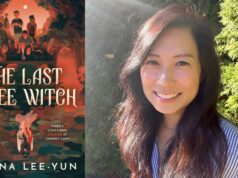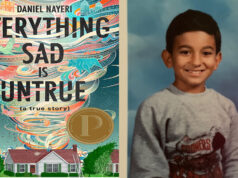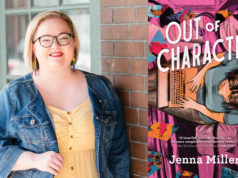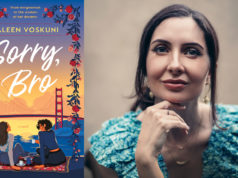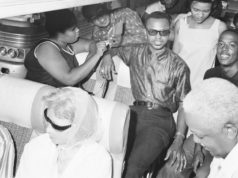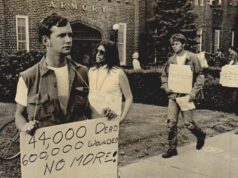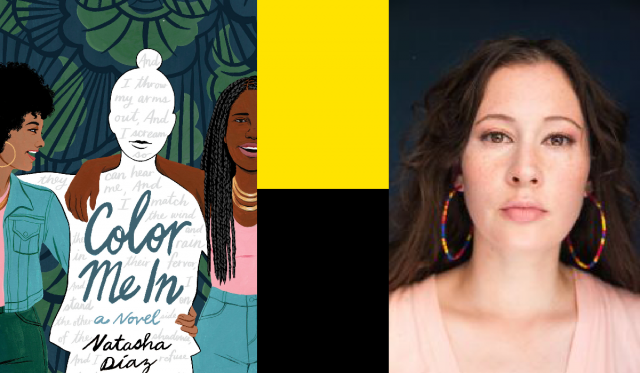

(Editor’s note: NonDoc’s Author Umbrella interviews up-and-coming writers, particularly authors of color, authors of disability and LGBTQ authors. The interviews have been transcribed and lightly edited for length and clarity.)
For this week’s Author Umbrella series, I interviewed Natasha Díaz, author of Color Me In. Her debut young adult novel, published by Random House, hit shelves on Aug. 20, 2019.
Color Me In is a coming of age story about Nevaeh Levitz, a biracial black, Jewish teen who is also white passing. After her parents’ divorce, Nevaeh, finds herself split between two worlds: the affluent suburbs where she grew up, White Plains, and Harlem, New York City, where her mother’s black Baptist family lives, all while planning her bat mitzvah (instead of a sweet 16 party.) As she navigates the push and pull of two cultures and struggles with identity and privilege, she also discovers the cost of silence and the power of her own voice.
1) The Color Me In cover is gorgeous! It really encapsulates visually what it’s like for a young girl figuring out who she is. What message do you hope young readers take away from Nevaeh’s story?
Thank you! I love the cover so much! It was designed by the genius that is Regina Flath, and the artist is Bijou Karman.
There are a few messages that I hope readers will take from Color Me In, one being that they should feel empowered to embrace who they are entirely. No one gets to dictate how you own your heritage, your sexuality, gender, or religion.
I also hope that reading the book makes everyone take a step back to evaluate and take ownership of their privileges and then activate those privileges to uplift communities who do not have the same benefits.
2) The book is loosely based upon you own experiences as a multi-racial teen. How closely did Nevaeh’s journey mirror your own, and if you could give the younger version of yourself any advice, what would it be?
This is a quote from #ColorMeIn about one of the most common microaggressions multiracial and biracial people face on a daily basis. It is something Nevaeh is still coming to terms with as she learns how to own her whole identity <3 pic.twitter.com/ESdErLODaF
— Natasha Color Me In is out now! Díaz (@TashiDiaz) July 11, 2019
While I did pull inspiration from my life, the book is mostly fiction. What I share with Nevaeh is a similar background, as well as the experience of not knowing where I fit within my various communities and whether I have a right to be my whole-self, despite the fact that I am perceived a different way as a result of how I look.
When it comes to my connection with my Jewish heritage, like Nevaeh, I also struggled to figure out how I can be a part of the community without being active in the religion.
If I could tell my younger self anything, I would try to encourage her to spend less time worrying whether she had a right to fit in and instead to focus on finding comfort and pride and wholeness within herself.
From there, it’s all about creating your unique place in the world instead of trying to fit within the confines created by society and other peoples’ boxes.
3) One of the central themes of the book is family. How has your own family influenced the way you wrote your characters and their familial dynamics?
Again, the book is fiction, but there are characteristics and intonations that were influenced or inspired by family members.
In terms of dynamics, I pulled a lot of experiences from my own life that I layered into the story, then adjusted to fit the narrative of the book.
For example, in the book, Nevaeh’s father forces her to have a belated Bat Mitzvah after he separates from her mother because he isn’t happy with the way she is changing and becoming more in touch with her Black identity after moving in part time with her mom’s family in Harlem. I was also forced to have a bat mitzvah as a result of my parent’s divorce (not belated), but in my real life, my father pushed for it because he wasn’t receiving 50/50 custody and wanted to be able to spend more time with me.
My being legally required to be raised Jewish meant we got to spend time together on the high holy days and Fridays when we went to temple, and when he would pick me up and drop me off before and after Hebrew school.
4) How do you think Color Me In might appeal to Oklahoma City readers?
I think the amount of multiracial, multiethnic, and interreligious families is growing rapidly, and I hope that whether you are a member of those communities or not, it might be interesting to learn about that experience and perspective, because chances are, you know someone or many people, who might relate to what Nevaeh and her family go through in the book!
5) On Twitter, you’ve been candid about your love for pickles, chocolate croissants, and pizza during your pregnancy. (Congratulations by the way!) What has been your favorite, craziest pregnancy food combination? And what message would you like to give your little one as he or she creates his or her own place in the world?
Hey #kidlit anyone else stressed AF about a deadline? I am currently trying to write a whole-ass draft in 6 weeks. In solidarity, I present to you my recent maternity photo shoot, taken by the genius that is @vestitoverde, as a reminder to myself & you that we can do anything 😘 pic.twitter.com/KZyFGvIfjx
— Natasha Color Me In is out now! Díaz (@TashiDiaz) August 26, 2019
Hahaha, thank you! I honestly haven’t had too many stereotypical food combo cravings, though I do love all the foods you mentioned above independently, and I definitely overindulge in sweets, which is odd because I am usually a savory person.
I had one very specific craving once for buffalo shrimp mac and cheese and sent my husband on a wild goose chase that resulted in him purchasing all the ingredients so I could just make it myself because… that isn’t a common menu item anywhere.
I hope I am able to encourage my child to be proud of who they are from an early age and confident in their ability to navigate their many cultures.
I hope they are cognizant of their place in the world and know when to use their voice but also when to take a step back and give the spotlight to someone with less privilege or opportunity.
More than anything, I hope they are kind and unafraid to own their mistakes, that I teach them to be grateful for every lesson they learn as a way to become a better version of themselves who can uplift their various communities as well as marginalized people all over the globe.









